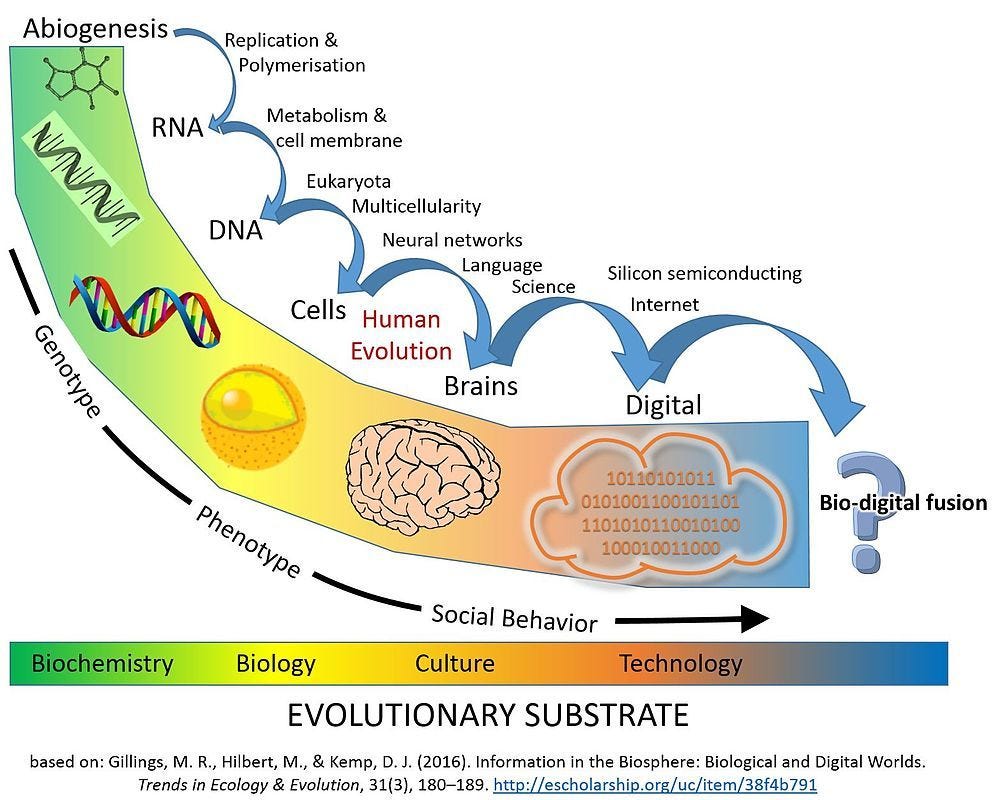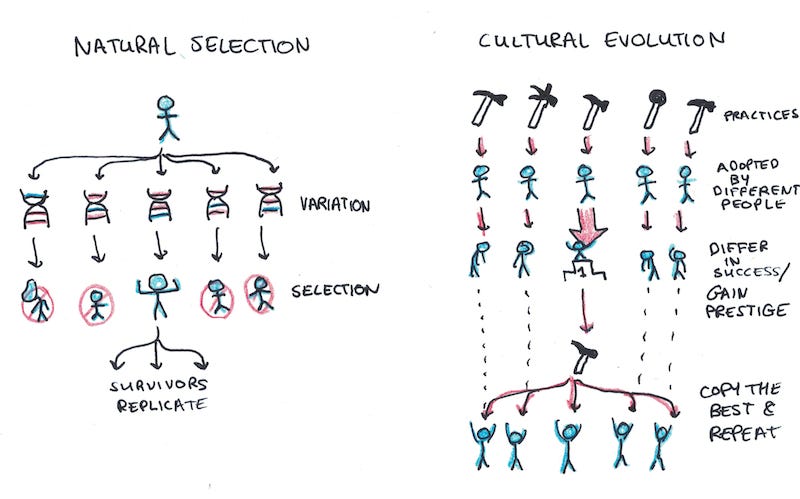As I mentioned in previous articles, human material progress is the outcome of long process of evolutionary change that involves the combination of simple objects to create more complex objects that are fundamentally different from their constituent parts. One can think of the history of the universe as the development of ever more complex evolutionary processes.
These evolutionary processes can be broken down into four basic types:
Cultural evolution (explained in this article) - change in human societies without necessarily delivering material progress for the masses.
Progress - a sub-set of Culture Evolution that delivers an increased material standard of living for the masses. Material progress only became possible when The Five Keys to Progress evolved.
In this article, I will explain cultural evolution.
The following is an excerpt from my book From Poverty to Progress: Understanding Humanity’s Greatest Achievement. You can purchase discounted copies of my book at my website, or pay full prize at Amazon.
If you enjoyed reading this series of articles, you might also be interested in reading my “From Poverty to Progress” book series:
Cultural Evolution
After billions of years of Biological evolution, modern humans evolved. Humans created a new form of evolution: Cultural evolution. Cultural evolution is the change of human societies over time via social learning.
The concept of Cultural evolution is one of the hottest topics in social science of the last few decades. Insightful thinkers such as Peter Richerson, Robert Boyd, Joseph Henrich, and Alex Mesoudi have given us valuable insights into the concept.
The theory of Cultural Evolution combines:
the theory of biological evolution via natural selection from Charles Darwin with
cultural anthropology, which emphasizes the concept of culture.
In particular, the theory of Cultural Evolution focuses on the interaction between biology and culture. While previous researchers saw biology and culture as mutually exclusive, those who uphold Cultural Evolution see culture as stemming from human biology.
As they see it, culture is part of human biology. Culture is neither nature nor nurture, but some of both. Humans evolved biologically to take advantage of social learning, and culture can be analyzed using the theory of natural selection.
If you are interested in the concept of Cultural Evolution, I would recommend reading the following book summaries in the following order:
“Not by Genes Alone: How Culture Transformed Human Evolution” by Richerson and Boyd
“The Origin and Evolution of Cultures” by Robert Boyd and Peter Richerson
“The Evolution of Everything: How New Ideas Emerge” by Matt Ridley
“Cultural Evolution: How Darwinian Theory Can Explain Human Culture” by Alex Mesoudi
If there is a book that you find particularly interesting, please support the author by buying the book.
Cultural evolution encompasses all elements of human societies including:
religion
ethnicity
language
dress
ideas.
I will mainly focus on innovations in technologies, skills, and social organizations, as they are the most closely related to material progress.
Cultural evolution builds on the previous forms of evolution by adding in:
conscious design
trial-and-error experimentation
copying
teaching.
It is no longer necessary to wait for accidental combinations to take place to form a higher synergy (i.e. a collection of smaller objects that create a more useful object). With Cultural evolution, human beings can deliberately:
create those combinations,
assess the usefulness of the results, and
iterate on those results.
Just as importantly, human beings can see the creations of other people, assess their usefulness, copy them, and modify them for different uses. Whereas biological evolution is based on survival and reproduction, the “survival” of a technology, skill, or organization is based upon its usefulness to humans.
Advantages of Cultural Evolution
Cultural evolution has many advantages over biological evolution in its ability to adapt to a highly complex and changing environment. In biological evolution, new variations are created randomly. In cultural evolution, humans can design a new variation to solve a problem.
Conscious design enables humans to consider many possible solutions and logically determine which variations have the greatest chance of success. In particular, potential innovators can ignore variations that seem unlikely to succeed.
In biological evolution, new variations are created only once per generation. For simple creatures with short lifespans measured in hours or days, this is not much of a barrier. For complex creatures with long lifespans measuring in decades, however, this is a serious constraint on the rate of innovation.
In cultural evolution, there are no limits on the number of innovations that can occur within one lifetime. Cultural evolution enables a successful innovation to spread rapidly through a society within one generation. This makes it far more likely that one person with the innovation will survive to pass it on to the next generation.
In cultural evolution, humans can share ideas and designs during the experimentation process. This increases the number of variations as well as increasing the success rate. So there is a greater chance that the new technology will be useful.
In biological evolution, an adaptation will only be propagated through a species if it confers an advantage when it comes to surviving and reproducing. In cultural evolution, humans can innovate solutions that do not directly impact their rate of survival and reproduction. They may, for example, create innovations that make their lives healthier and more enjoyable.
In biological evolution, genes cannot choose to share themselves with others. In cultural evolution, humans often share skills with other humans by consciously making it easier for others to copy them. We call this teaching.
Teaching consists of a large number of complex tasks:
Explaining important concepts related to mastering a skill
Breaking the skill into manageable chunks
Demonstrating the proper actions
Carefully watching their student attempt to copy those actions
Noticing incorrect actions taken by the student
Explaining to the student how they can improve
Emotionally reassuring the students after they fail, so the student will keep trying.
In biological evolution, a person can only acquire new information from the genes of their biological mother and father. In cultural evolution, a person can acquire new information from a wide variety of people, including:
Extended family (grandparents, aunts, uncles and cousins)
Friends
Neighbors
Teachers
Co-workers
Strangers who use information storage technologies, such as books or the internet.
The wide variety of potential people to copy gives humans far more examples than would be possible if they were restricted to biological evolution.
In biological evolution, people cannot consciously choose whose genes to copy. The genes of children can only copy the genes of their biological parents. In cultural evolution, people can consciously choose whom to copy. This greatly increases the chances that they are copying a useful innovation.
Common strategies include copying:
The most successful person in a community (for example, a successful merchant, athlete, or hunter)
The most prestigious person in a community (for example, the local lord or celebrity)
The person most similar to themselves (for example, someone of the same occupation, gender or ethnicity)
The majority of people in their local environment (hence the classic phrase “When in Rome, do as the Romans do”)
Each strategy for copying is likely to lead to a different solution, leading to greater variation within a society. This increases the likelihood that the result will be useful.
Cultural evolution also enables an individual to copy multiple people, each with unique varieties of skills, technologies and behaviors. As I mentioned earlier, studies have shown that a person who copies many different people is more likely to get positive results than an individual who copies only one person.
An individual who copies five different people instead of one can pick specific elements that appear to work for each person, then recombine them with other elements from other sources. In this way, copying leads to new variations with a higher chance of success. Once again we see how copying leads to innovation.
In biological evolution, all information related to survival and reproduction is based upon the local environment. It is possible to be highly adapted to a specific microenvironment, while also being totally unable to survive in another environment.
In cultural evolution, humans in one society can see solutions that work substantially better for another society in a different environment. This is particularly true once transportation and communications technologies evolved enough to enable humans of very different geographical locations to interact regularly with each other.
Biological evolution operates almost exclusively on the individual. While animals can combine into social organizations, these social organizations are usually very simple and composed of other animals that are almost identical to each other. In cultural evolution, humans can form complex social organizations composed of people with widely varying skills. This enables far more complex solutions to evolve.
Biological evolution requires a certain amount of stability in the environment so that optimal solutions can be found. Biological evolution is good at finding optimal solutions within environments that either do not change or change at a slow rate in a consistent direction. Very rapid changes in the local environment can lead to wide-scale extinctions.
Cultural evolution enables humans to adapt to rapid changes in the environment within one generation as well as rapidly swinging directions of change. This makes cultural evolution far more flexible than biological evolution.
Despite all its advantages, it is important to keep in mind that cultural evolution also has some important disadvantages. Because human beings copy those around them, ideas and practices can evolve that are highly detrimental to humans, either as individuals or as societies. We will come back to this phenomenon later.
The above was an excerpt from my book From Poverty to Progress: Understanding Humanity’s Greatest Achievement. You can purchase discounted copies of my book at my website, or pay full prize at Amazon.
You might also be interested in reading my other posts on Progress and Evolution:
Understanding cultural evolution (this article)
If you enjoyed reading this series of articles, you might also be interested in reading my “From Poverty to Progress” book series:












quick comment ref your Upward Bound posting:
1) I did not see how to access your continued "free" viewing for nonsubscribers
2) there might have been a typo in the 3rd from last paragraph? "Instead of the disincentives that our current programs give, they will [not???] have strong material incentives to work full-time, get married, and have children.
Since you do not like OT comments, I will not say more here [delete this as you please].
I think your distinction between cultural evolution as not really involving mass material improvements vs. progress that does provide that mass improvement is a useful aspect to consider. But your essay today seems to sort of by accident include advances of wider application, that also happen to have some technological aspects as well. Adopting hammers? Converging on particular clothing fashions. Perhaps examples of political structures or religious expansions should be included as part of cultural evolution, long before the modern technical world and scientific method came along?
This leads me to wonder if there isn't a tighter interconnection between those two states/ stages. In trying to understand this, it seems to me that cultural evolutions occurring without mass benefit must then be occurring in very structured or hierarchical societies, where only the leaders or wealthy can obtain them (in the short run). But isn't part of the definition of culture the set of behaviors and practices used by a given group of people? If that group is too small, is it really valid to call that a cultural impact or capability? I see something of a chicken and egg condition here?
[Upon rereading the above paragraph, perhaps it is more correct to explore such evolution as a bifurcated (or multiple set) result: distinct cultures evolved by the wealthy and the non-wealthy, etc. They are spread to subsets of the population but not to the total group -- therefore not "progress" per your definition.]
Plus, given the range of material progress exhibited by different societies over the last 200 years, your selection of the (particular cultural adaptation) of finding and using high density energy sources to jump over or bridge the Malthusian trap may be the major cultural adaptation among the whole long history of such cultural developments.
It occurred to me just now that the cultural evolution leading to adopting the scientific method might have been a necessary precursor to the wider discovery and use of fossil fuels? Someone had to discover the science of combustion and how to measure the relative energy available from various sources? In turn preceded by the discovery of gases and of oxygen in particular?
I will say that your Substack and Progress Project has caused me to explore more ideas and relationships than most of the previous political or technical topics I have been examining. Thank you for that.